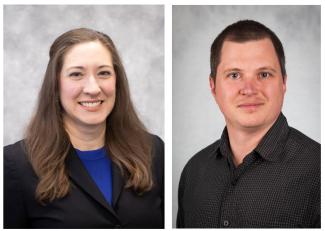A pair of NETL employees — Alexandra “Ale” Hakala, Ph.D., and Joseph Stoffa, PhD. — have been named Fellows in the 2023 cohort of the Oppenheimer Science and Energy Leadership Program (OSELP), the premier, yearlong leadership development initiative of the National Laboratory Directors’ Council (NLDC).
Hakala and Stoffa will join 32 other individuals from 15 U.S. Department of Energy (DOE) National Labs to explore the complexities, challenges and opportunities facing the National Lab system and the Department of Energy (DOE). Through a series of site visits to National Labs, OSELP immerses its Fellows in the singular breadth, diversity and complexity of the National Labs, DOE and their partners, and provides them with a unique opportunity to engage deeply with senior Lab leadership and explore innovative ways to improve the DOE and National Lab collective enterprise.
They will also collaborate on the development of think-pieces that address major organizational, policy, scientific and other challenges within the National Labs’ mission space. These think-pieces are presented to the NLDC and other senior leaders at a capstone event. OSELP Fellows also benefit from the experience and advice of program mentors. Mentors are drawn from former Lab Directors, former senior DOE officials and other distinguished professionals. Exposure to these senior leaders can have a transformative impact on the perspectives and career trajectories of cohort members.
“Selection as an Oppenheimer Fellow is a highly competitive process,” said NETL Director Brian Anderson, Ph.D. “By participating in the program, these two exceptional employees will bring back best practices to share with their NETL colleagues while developing their skills to serve as leaders of the DOE-National Labs system.”
In his nomination letter to OSELP, Anderson noted that Hakala, an environmental geochemist who currently serves as acting senior fellow for NETL Geological and Environmental Systems, is a highly experienced and innovative scientist who has expertly executed a wide range of research assignments that have significantly advanced the NETL goal of delivering innovations and solutions for an environmentally sustainable and prosperous energy future.
Since she first became affiliated with NETL as a postdoctoral research associate through the Oak Ridge Institute for Science and Education in 2008, Hakala has “exhibited the keen intellect and inquisitive mind that led to advancements for innovative energy approaches. Those same qualities can help meet the important challenges faced by our National Lab system,” Anderson stated.
He also stated that Hakala has worked on key research topics of critical importance to the nation’s energy future. These efforts have included serving as a technical portfolio leader for NETL’s Onshore Unconventional Resources Portfolio.
Stoffa joined NETL in November 2008 as a federal project manager within the Advanced Energy Systems Team (now the Hydrogen with Carbon Management Team). Since then, Stoffa “has become an established leader who is currently advancing a portfolio of projects to develop valuable new uses for converting carbon dioxide (CO2) into valuable products,” Anderson stated.
The Carbon Conversion Program seeks to identify and develop new and improved materials, equipment and processes that produce value-added goods and services using CO2 as a feedstock. Pathways to generate products are diverse and can include carbon uptake to grow algae, chemical and biological conversion, and mineralization. Products include fuels, chemicals, agricultural products, animal feed, building materials and other goods and services.
Anderson added that Stoffa, a technology manager who oversees the Carbon Conversion and Carbon Ore Processing programs, has served with distinction to keep government-funded extramural research within scope, schedule and budget. His management has advanced other technologies, including the development of solid oxide fuel cells, which will play a crucial role in DOE’s efforts to address climate change.
The Oppenheimer program — named for J. Robert Oppenheimer, head of the Los Alamos National Laboratory during World War II — was developed in 2016 to introduce the next generation of DOE leaders to the breadth and depth of the National Laboratory system, expose them to the challenges and complexities of managing this system and equip them with the knowledge, experiences and professional networks to succeed as DOE leaders.
NETL is a DOE national laboratory that drives innovation and delivers technological solutions for an environmentally sustainable and prosperous energy future. By leveraging its world-class talent and research facilities, NETL is ensuring affordable, abundant and reliable energy that drives a robust economy and national security, while developing technologies to manage carbon across the full life cycle, enabling environmental sustainability for all Americans.




